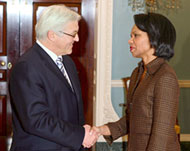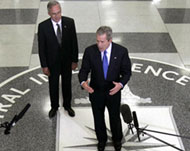Rice: Mistakes made in war on terror
Condoleezza Rice has acknowledged that the US might make mistakes in its battle against terrorism and promised to put them right if they happened.

But the US secretary of state on Tuesday restated her defence of the legality of US tactics against a violent enemy which “operates from within our society and is intent … on killing innocent civilians”.
“Any policy will sometimes result in errors, and when it happens, we will do everything we can to rectify it,” Rice said at the start of a European tour overshadowed by allegations of illegal CIA methods against terrorist suspects.
Speaking in Berlin, she declined to comment on the case of a German man, Khaled el-Masri, who was allegedly abducted to Afghanistan and imprisoned there for five months last year until the CIA realised it had got the wrong man.
But Angela Merkel, the German Chancellor, said the US government had acknowledged it blundered over el-Masri, who plans to sue the CIA in a case to be filed in the US later on Tuesday.
Furore in Germany
“I’m pleased to say that we spoke about the individual case, which was accepted by the United States as a mistake, and so I’m very pleased the foreign minister has reiterated that if mistakes are made, they must immediately be rectified,” Merkel told a joint news conference.
 |
|
Rice (R) visited Germany at the |
El-Masri’s case has caused a furore in Germany, fuelled by a US newspaper report that the then interior minister was told of the case in May 2004 and agreed to a request from the US ambassador to keep it quiet.
Merkel said she would ask Foreign Minister Frank-Walter Steinmeier, who was head of the chancellor’s office in the last government, to report on the el-Masri case to the parliamentary committee responsible for supervising the security services.
Rice was not challenged directly over reports the US had run secret prisons to hold terrorism suspects in eastern Europe, which Washington has refused to confirm or deny.
Methods defended
But she defended US methods in its struggle against 21st-century fighters.
“If you don’t get to them before they commit their crimes, they will commit mass murder,” she said. “We have an obligation to defend our people and we will use every lawful means to do so.”
 |
|
The CIA has been under fire over |
She stressed that the US operated strictly “within the context of laws and our international obligations”.
In comments over the past two days, Rice has sought to shift from defence to attack over US tactics, countering criticism by telling Europeans that US intelligence also prevents attacks and saves lives in their own countries.
There were signs she had succeeded in drawing some of the heat out of the issue in her talks with Merkel, who welcomed her assurances.
Merkel’s reaction
The German leader is keen to restore warm relations with Washington after a deep chill under her predecessor, Gerhard Schroeder, who was never forgiven by the US government for opposing the invasion of Iraq.
|
“Any policy will sometimes result in errors, and when it happens, we will do everything we can to rectify it” Condoleezza Rice, |
In the closest she came to criticism of the US, Merkel said there must always be a balance between fighting terrorism decisively and conforming to democratic principles.
Europe’s leading human rights watchdog is checking out press reports on CIA secret prisons, as well as flights by CIA planes across the continent which it believes may have been used to transport suspects covertly.
The EU as a whole, and at least eight member states separately, have sought clarification from Washington.
Interrogation techniques
A new television report on Monday cited current and former CIA officials saying al-Qaida suspects had been held in Europe until last month but were then transferred to North Africa.
US channel ABC news added that interrogation techniques included sleep deprivation and a practice in which the subject feels they are being drowned, but that these were not classified as torture.
The CIA declined to comment.